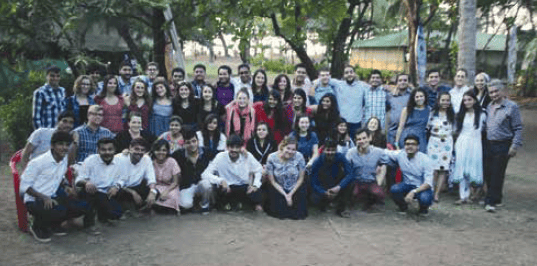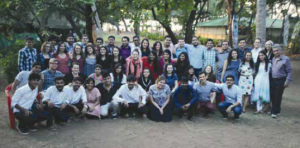This past December I was incredibly lucky to spend 10 days with the Joint Distribution Committee ( JDC) to experience Jewish life in India. Prior to applying to this trip for college students, I was completely unaware that Jews lived in India, let alone in three distinct Jewish communities, each with separate origins.
Most of our trip was focused on the Bene Israeli community near Mumbai, formerly Bombay. The Bene Israelis believe that they descend from seven Jewish couples who survived a shipwreck off the shores of Alibaug near Mumbai after they left Israel around the time of the Hanukkah story.
I was really surprised to travel halfway around the world to make Indian friends my age, who shared my same major as me and liked the same TV shows I do. (One of my new Indian friends and I even share the same name.) Although they live in such a small, isolated community, they were all so incredibly proud and passionate about their Judaism.
One of the unforgettable highlights of the trip was spending Shabbat with our Jewish peers at a camp outside Mumbai. This camp, which happens only twice a year, is one of a few opportunities for these Jewish teens to be fully immersed in Judaism. For many, this is one of their few opportunities each year to experience a traditional Shabbat.
In order to hold Shabbat Services, several members of the Jewish Youth Pioneers (JYP) committed to bring a Torah from Mumbai to Dapoli. These Jewish teens had such respect for the Torah that they made sure that someone always held it so that it never touched the ground or the seat during the entire journey.
This was a pretty impressive feat as the six-hour trip became a nine-hour ordeal on back roads through small villages.
While most of their traditions are similar to ours, the Indians did several things I had never seen before. At Shabbat dinner when saying the blessing over the Challah, the Bene Israelis eat a date and a banana so they can say two more blessings. They believe saying more blessings brings you closer to God.
At Friday night dinner, we sang the song Kol Haolam Kulo (“The whole wide world is a very narrow bridge and the main thing is to be strong and have no fear at all” ) in Hebrew and English. Then the JYP taught us the song in Hindi, so we sang together in all three languages.
The JYP teens conducted a beautiful Shabbat morning Service. The Bene Israelis practice more traditional customs, so the men and women sat on opposite sides of the room. So many were eager to participate in the Torah service that the aliyot had to be split up to accommodate all the men who wanted to read from the Torah. Seeing all they put into the service was really touching.
Following Havdallah on the beach on the Arabian Sea, we danced to American music and learned Bollywood dances.
After Shabbat at the camp, we returned to Mumbai (another 12 hours with a team of dedicated Torah holders) to tour the city with an emphasis on the Jewish sights. We visited the Magen David Synagogue built by the influential Bagdahdi Jews, the Sassoons. While this bright blue synagogue is incredibly beautiful today, I can’t even imagine how stunning it must have been during its prime. I loved the two old synagogues we visited in Mumbai, but my favorite was the Magen Aboth synagogue in Alibaug, the nearby island where the Bene Israelis believe their ancestors shipwrecked. To enter the beautiful pink building, we had to take off our shoes, which is the synagogue’s custom. There, we met an 87-year-old cantor, one of the few remaining Jews left in Alibaug who sang Lecha Dodi for us. It gave me the chills.
Hidden inside one of the world’s most populated countries is this small, yet thriving Jewish community with ancient roots. Playing an important role in this Jewish community is the JDC. Operating out of the Evelyn Peters Jewish Community Center, which is essentially one big room, the JDC brings Jews together for informal Jewish educational opportunities. JDC sponsors numerous programs in India including Gan Katan, Sunday school for young kids; Torah study classes for adults; JYP for teens; and the Bayiti home for the elderly.
The JDC also reaches beyond the Jewish community to partner with Gabriel Project Mumbai, a non-governmental organization that helps with nutrition, literacy and health education for children in the slums.
This trip really opened my eyes to both India’s amazing Jewish community and the JDC’s incredible work around the world. I hope to return to India with the JDC to work with this remarkable Jewish community.
by Elli Peck Friedman


